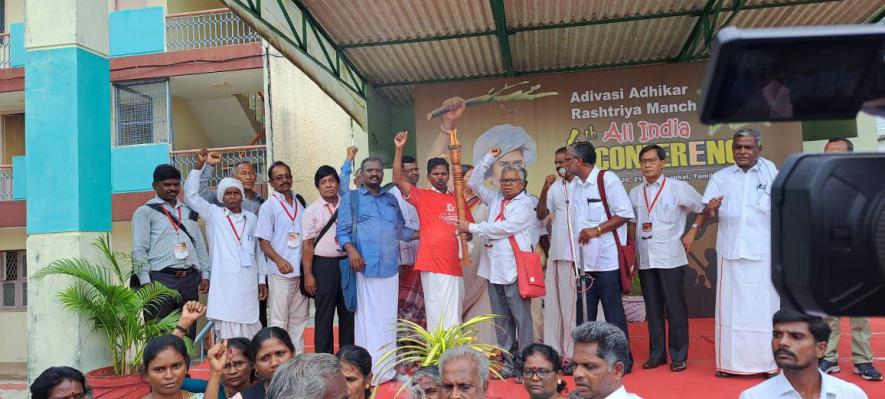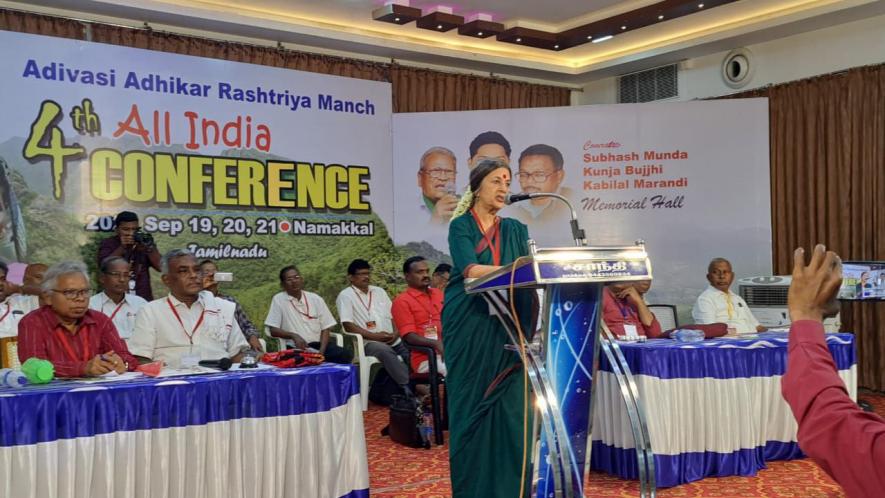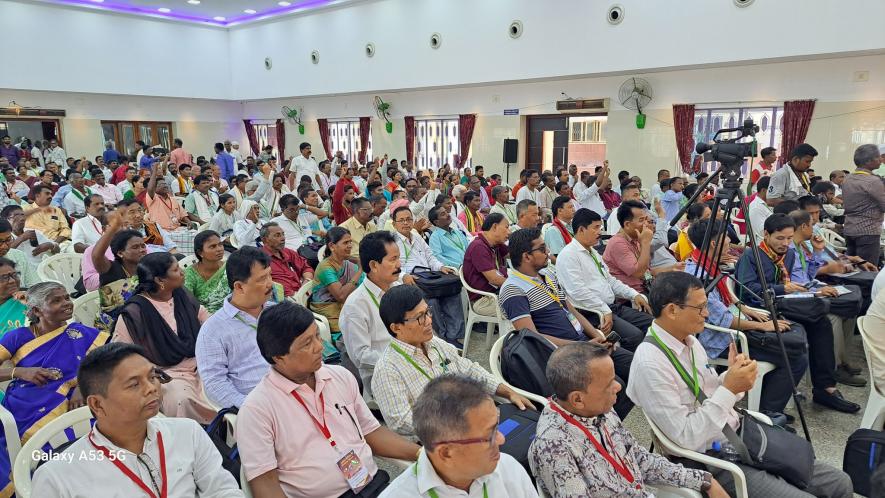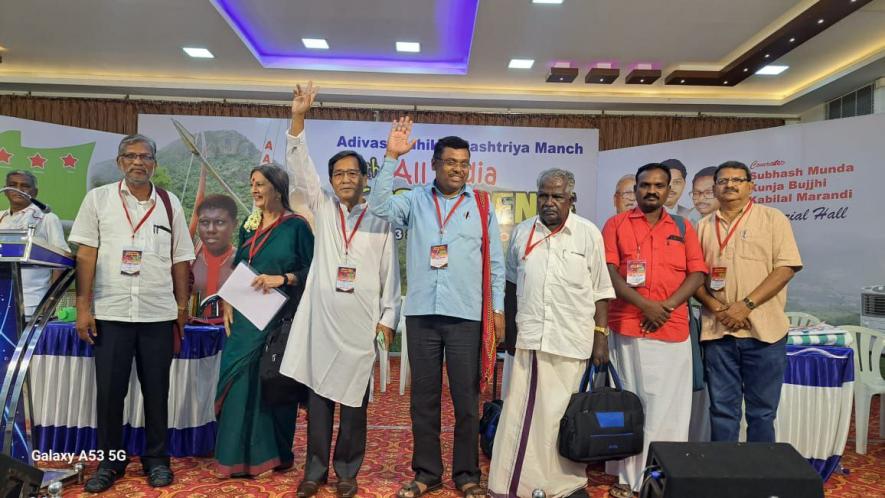Chennai: The Adivasi Adhikar Rashtriya Manch (AARM) pledged to safeguard and expand the hard-won customary rights of the forest-dwelling people in its fourth national conference held between September 19 and 21. It resolved to strengthen the struggles against the “anti-tribal policies of the Bharatiya Janata Party (BJP)-led Union government and the multi-pronged attacks on adivasi people”.
The three-day conference discussed a number of pressing issues affecting tribal people on Thursday. Large-scale land grabs, fund cuts, attacks on gram sabhas, shrinking education opportunities, unfulfilled vacancies in the public sector and the struggle to obtain Scheduled Tribe certificates were some of the issues.
Around 380 adivasi activist delegates, representing 14 states, participated in the conference held in Namakkal, Tamil Nadu.
On the final day of the conference, AARM elected a 61-member executive committee and 17-member national coordination committee (NCC) to lead the struggle at the national level. Jitendra Chaudhury was elected as the chairperson, Brinda Karat as vice chairperson, Pulin Bihari Baske as convenor, Dhulichand Meena and Thirupathi Rao as vice convenors and Dilli Babu as treasurer.
AARM is a joint platform of state-level organisations fighting on tribal issues.
INAUGURAL SESSION
As part of the inaugural session, president Baburao hoisted the AARM flag, delegates paid homage to martyrs and vice president Tirupathi Rao moved the condolence resolution.
P Rajeeve, Kerala minister for industries and law, delivered the inaugural address. He said, “Although we belong to different ethnic groups, cultures and traditions, we are united by one point, that of being Indians. But the present BJP-led Union government is trying to destroy the philosophy of unity in diversity.”

AARM leaders with the martyrs’ torch ahead of the inaugural session.
He added, “As a basic right, internet facility is taken to all parts of Kerala. Underprivileged and backward students are given financial assistance of up to Rs 25 lakh to study up to post-graduation. Poverty-free Kerala project plans to provide housing to the homeless by 2025.”
RESOLUTIONS PASSED
The conference rejected the recent amendments to the Forest Conservation Act of 1980, stating that they undermine the constitutional and legal rights of gram sabhas to own and manage forests. The amendments also usurp powers of the state government, the Manch observed.
The Manch expressed deep concern about the situation in Manipur underscoring that even after four months, the Northeastern state is far from returning to normalcy with thousands of people displaced. The conference condemned the horrific cases of sexual assault on Kuki-Zo tribal women, and the prime minister’s refusal to intervene – giving a free hand to the chief minister.

Brinda Karat addressed the delegates at the conference.
The AARM opposed the demand made by some RSS-affiliated organisations that adivasis converted to religions other than Hinduism, particularly Christianity, should be delisted from Scheduled Tribes. The resolution read: “A sinister objective of this campaign is to bring land belonging to Christian adivasis outside the coverage of protections granted by the Schedule V of the constitution to make land-grabbing easier.”
The conference also noted that adivasi/tribal does not refer only to people living in the hills, but the issues of urban people belonging to tribal communities will also be addressed by the Manch.
COMMISSIONED PAPERS
Studies were commissioned by the AARM to understand communalism among adivasis, the status of adivasi women, and the state of education among the tribes of India.
The paper on growing communalism among tribal people read: “The continual denigration of converted communities and the aggressive ‘ghar vapasi’ campaign by Hindutva forces have resulted in a significant divide between Christian and non-Chrisitan groups.”

The delegates diligently participated in the sessions.
The commission paper on everyday challenges and struggles of adivasi women argued that with the deepening capitalist and neo-liberal transformation, adivasi women emerge as the most vulnerable. “The limited rights that women in certain adivasi communities possessed, such as property transfer, are also being snatched away from her,” it said.
With the “disintegration of the adivasi world and proletarianisation”, adivasi women form a large part of the migrant labourers, and human trafficking and sex rackets are an offshoot of the migration, noted the paper.
The paper on the education of adivasi children observed: “Under the Modi government, the approach of the Indian State towards compulsory and universal education for all children shifted from an indifference to one of active obstruction. […] The prolonged closure of schools during the Covid-19 pandemic resulted in an irreparable loss to the education of adivasi children.” This has led to a large number of dropouts, irregular disbursement of scholarships, and learning gaps among students who returned to school, it states.
Leaders from fraternal organisations participated in the conference and extended their solidarity. Among them were Centre of Indian Trade Unions (CITU) secretariat member G Sukumaran, All India Kisan Sabha (AIKS) general secretary Vijoo Krishnan, All India Agriculture Workers’ Union (AIAWU) general secretary B Venkat, Students Federation of India (SFI) president V P Sanu, All India Democratic Women’s Association (AIDWA) secretary P Suganthi, and Dalit Soshan Mukti Manch (DSMM) leader Samuel Raj.
Courtesy: Newsclick

